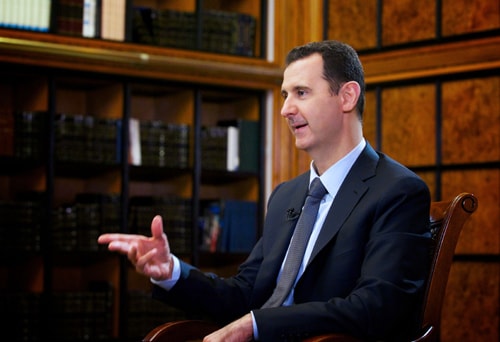Syria joins the Organization for the Prohibition of Chemical Weapons on October 14
After Russia and the US reached an agreement on destroying chemical weapons in Syria, a UN spokesman announced on September 14 that Syria had met the mandatory regulations to join the Organization for the Prohibition of Chemical Weapons (OPCW) and would become a member of this organization from October 14.
After Russia and the US reached an agreement on destroying chemical weapons in Syria, a UN spokesman announced on September 14 that Syria had met the mandatory regulations to join the Organization for the Prohibition of Chemical Weapons (OPCW) and would become a member of this organization from October 14.
From New York, UN spokesman Martin Nesirky said Secretary-General Ban Ki-moon welcomed Syria's decision to join the OPCW after the multinational organization received additional documents from Damascus. A statement from the UN press office stated: "With the authority provided for in the Convention on the Prohibition of the Development, Production, Stockpiling and Use of Chemical Weapons and on their Destruction, the UN Secretary-General on September 14 received the formal application for membership from the Islamic Republic of Syria... The accession to the OPCW will officially take effect from October 14."
 Syrian President Bashar al-Assad affirmed that the Damascus government will place the country's chemical weapons stockpile under international control on September 14. Photo: AFP/VNA |
Earlier, reacting immediately after Washington and Moscow reached a common voice on the issue of chemical weapons in Syria, Secretary-General Ban Ki-moon welcomed it and expressed hope that this consensus would pave the way for a political solution, leading to an end to the conflict that is weighing heavily on the Syrian people.
Sharing the same view, US President Barack Obama stressed that the Syrian President Bashar al-Assad's government must seriously implement its commitment, and Washington's stance is to continue maintaining its military position in the region to put pressure on the Assad government. Previously, Mr. Obama asked the US Congress to postpone voting on the military strike plan against Syria to prolong the time for negotiations between Russia and the US.
The international community seemed to breathe a sigh of relief and take positive steps after Russia and the US found consensus on the Syria issue. On September 14, the North Atlantic Treaty Organization (NATO) welcomed the agreement. NATO Secretary General Anders Fogh Rasmussen considered this an important step towards the goal of ensuring the rapid, safe and verifiable destruction of Syria's chemical weapons stockpile. Mr. Rasmussen also shared the view with President Obama that the core issue now is Syria's full and complete compliance.
The European Union (EU) also welcomed the agreement and offered to help implement it. EU High Representative for Foreign Affairs and Security Policy Catherine Ashton pointed out that a number of EU member states with the necessary technical expertise were ready to help carry out these important and urgent tasks.
Meanwhile, Iran - a close ally of Syria, said that the US no longer has a reason to attack Damascus after US Secretary of State John Kerry and his Russian counterpart Sergei Lavrov reached an agreement in Geneva to eliminate Syria's chemical weapons stockpile. Iranian Deputy Foreign Minister Amir-Abdollahian stressed that this new development shows every reason to rule out a military strike against Syria.
While the international community sees the agreement between Russia and the US as a "light at the end of the tunnel" to help end the nearly three-year conflict in Syria, the country's opposition opposes the agreement and refuses to declare a ceasefire with the government army. In a statement, Salim Idris, a general of the Free Syrian Army, said that this consensus only includes the US and Russia, so the opposition forces do not accept it and continue to act against the government. The general also said that the Assad regime has transferred some chemical weapons to Lebanon and Iraq. However, the Iraqi government immediately denied this accusation.
Ali al-Mosawi, the press adviser to the Iraqi Prime Minister, said that the claims by some members of the Syrian opposition that the Syrian regime had transferred part of its chemical weapons to Iraq were an attempt to tarnish the image of Iraq. Mr. al-Mosawi called on all sides to act in the interests of Syria and its people, affirming that Iraq rejects the possession of these weapons and other weapons of mass destruction anywhere in the world and for any reason.
Syrian rebels order chemicals to produce sarin
On the same day, Iran's semi-official Fars news agency cited the investigation results of prosecutors in the southern Turkish city of Adana, saying that Syrian rebels had ordered chemicals to produce the nerve agent sarin from this neighboring country.
Earlier, on May 28, Turkish security forces found a 2 kg sarin container when searching the residence of members of the Al-Nusra Front, which is linked to the Al-Qaeda terrorist network. Five Turks and one Syrian were arrested on charges of "purchasing chemical weapons in Turkey". According to a 132-page document from prosecutors, the suspects had contacts with extremist Islamist groups in Syria, including the Al-Nusra Front and the Islamic State of Iraq and the Levant.
According to the document, the Al-Nusra Front and the Ahrar al-Sham group sought to purchase large quantities of sarin nerve gas and other chemicals in Türkiye, then smuggle them into Syria to prepare toxic substances. According to the content of the calls collected by investigators, the above subjects ordered at least 10 tons of chemicals.
According to News - TH






